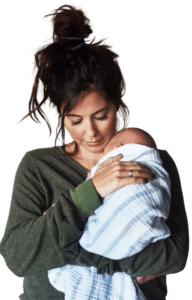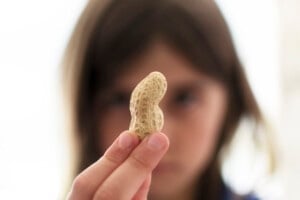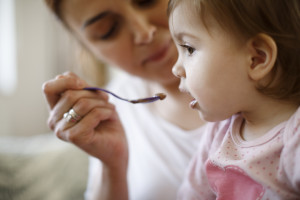These days, it seems food allergies are everywhere and on the rise. Experts estimate that 1 in 13 children suffer from severe food allergies. This means that at least two children per classroom could be affected. What is to blame for this? How can peanut butter be one child’s favorite food while being deadly to the next? Does solid food introduction have anything to do with this? But with all the conflicting information regarding when and how best to introduce babies to allergens and foods, what is the right way? Here’s the scoop on food allergies and solid food introduction.
Food Allergies and Solids
Perhaps the most important study that has been done in recent years is called the LEAP study. The LEAP study found that introducing peanuts to an infant diet before 11 months reduced the prevalence of a peanut allergy by up to 80%! This study led to a fundamental change in how professionals recommend families introduce solids and allergens to infants. Since then, many studies have replicated these findings and have supported the early introduction of foods as an effective way to prevent the development of food allergies.
Because of this, the latest recommendations are that babies should start solid foods as of 4 months of age, and exposure to allergens can begin as early as 6 months of age in the average baby. Research has shown that early exposure can have a protective effect in reducing the chance a baby would develop an allergy! Of course, there are many exceptions to this rule, such as whether a baby has already developed severe eczema or a strong family history of food allergies and specific factors that may require children to be under the care of a specialist. The most important thing to keep in mind is to consult with your pediatrician regarding your children in particular. No two babies are alike, and your child may require a personalized approach.
How to Minimize Your Child’s Risk
Here is what you can do at each stage of your child’s life to minimize their risk for allergies:
During Pregnancy and Newborn Period
- First off, ensure you take your prenatal vitamins. You may also want to consider a probiotic-rich diet and exposing your unborn baby to a wide variety of foods. Try not to limit any type of food during pregnancy. Remember, your baby will eat what you eat, and the more you expose to them, the better!
- Breastfeed if possible. Breastfeeding exposes your baby to a wide variety of allergens early on in their life. Eat a hearty and well-balanced diet while breastfeeding without avoiding major food groups if you can. If you’re unable to breastfeed, don’t fret, you still have other opportunities to expose your baby to a variety of different allergens.
- Talk to your pediatrician about whether vitamins are appropriate for your baby/child.
For the First Year of Life
- As mentioned, we recommend starting solids as early as four months of age for most babies. Start with one food at a time, first with pureed vegetables, fruits, then meats.
- Allow your children and babies to get dirty at an early age. Mealtimes are supposed to be messy! Expose them to pets and the outdoors from the day they are born.
- Be actively involved in mealtime with your baby. Talk to your babies while feeding. Let them know why food is good for them. Teach them about food early on.
- Do not get discouraged if your baby seems to dislike a certain type of food. Keep trying to expose them to it. Taste buds change!
- We recommend allergen exposure such as peanuts and eggs as early as six months of age with your pediatrician’s guidance. If you have concerns about intolerance or allergy, a family history of food allergies, please talk to your pediatrician.
- Once you start peanut introduction, continue it as a part of their diet at least three times a week for consistent exposure to the allergen. There are several peanut products available, like peanut butter, peanut paste, oil, and powder.
- Avoid honey until one year of age due to the risk of botulism.
For Toddlers and Early Childhood
- Set a precedent for a consistent mealtime routine without screens and distractions.
- Set a good example for your children by eating together as a family and eating a healthy, well-balanced diet yourself! Do you see a pattern yet? It all starts with you!
- Avoid starting your baby on an allergy medication too early in life unless specifically recommended by your pediatrician. Allow your baby’s body to evolve and build a tolerance to the world around them.
No matter how you choose to expose your children to the world around them, the choice is yours. In summary, while science has indicated that early exposure to food allergens is the superior method for introduction, talk to your health care provider about the best way to move forward with your baby.














